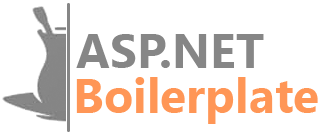In this document
Introduction
OpenIddict aims at providing a versatile solution to implement OpenID Connect client, server and token validation support in any ASP.NET Core 2.1 (and higher) application. ASP.NET 4.6.1 (and higher) applications are also fully supported thanks to a native Microsoft.Owin 4.2 integration.
Startup Project
This document assumes that you have already created an ASP.NET Core based project (including Module Zero) from the startup templates and have set it up to work. We created an ASP.NET Core MVC startup project for this demonstration.
Installation
There are 3 NuGet packages:
- Abp.ZeroCore.OpenIddict is the main integration package.
- Abp.ZeroCore.OpenIddict.EntityFrameworkCore is the storage provider for EF Core.
- Abp.AspNetCore.OpenIddict is the package for ASP.NET Core.
Install Abp.ZeroCore.OpenIddict package to your Core project and add a module dependency to AbpZeroCoreOpenIddictModule.
Install Abp.AspNetCore.OpenIddict package to your Web project and add a module dependency to AbpZeroCoreOpenIddictEntityFrameworkCoreModule.
Install Abp.ZeroCore.OpenIddict.EntityFrameworkCore package to your EntityFrameworkCore project and add a module dependency to AbpAspNetCoreOpenIddictModule.
Configuration
Configuring and using OpenIddict with Abp.ZeroCore is similar to independently using OpenIddict. You should read its own documentation to better understand how
EntityFrameworkCore Project
You need to implement IOpenIddictDbContext in your DbContext class. This will add Entities required by OpenIddict to your DbContext.
After this, call modelBuilder.ConfigureOpenIddict(); in the OnModelCreating method of your DbContext.
Then, create repositories inherited from below classes;
EfCoreOpenIddictApplicationRepositoryEfCoreOpenIddictAuthorizationRepositoryEfCoreOpenIddictScopeRepositoryEfCoreOpenIddictTokenRepository
Web Project
In your web project, create Controllers inherited from generic controllers defined in ASP.NET Boilerplate;
AuthorizeControllerTokenControllerUserInfoController
Create a static class to Configure OpenIddict in your Web project and call it in Startup.cs;
public static class OpenIddictRegistrar
{
public static void Register(
IServiceCollection services,
IConfigurationRoot configuration,
Action<OpenIddictCoreOptions> setupOptions)
{
services.Configure<AbpOpenIddictClaimsPrincipalOptions>(options =>
{
options.ClaimsPrincipalHandlers.Add<AbpDefaultOpenIddictClaimsPrincipalHandler>();
});
services.AddOpenIddict()
// Register the OpenIddict core components.
.AddCore(builder =>
{
builder
.SetDefaultApplicationEntity<OpenIddictApplicationModel>()
.SetDefaultAuthorizationEntity<OpenIddictAuthorizationModel>()
.SetDefaultScopeEntity<OpenIddictScopeModel>()
.SetDefaultTokenEntity<OpenIddictTokenModel>();
builder
.AddApplicationStore<AbpOpenIddictApplicationStore>()
.AddAuthorizationStore<AbpOpenIddictAuthorizationStore>()
.AddScopeStore<AbpOpenIddictScopeStore>()
.AddTokenStore<AbpOpenIddictTokenStore>();
})
// Register the OpenIddict server components.
.AddServer(options =>
{
// Enable the token endpoint.
options.SetAuthorizationEndpointUris("connect/authorize", "connect/authorize/callback")
.SetTokenEndpointUris("connect/token")
.SetUserinfoEndpointUris("connect/userinfo");
// Enable the client credentials flow.
options.AllowClientCredentialsFlow();
options.AllowPasswordFlow();
options.AllowAuthorizationCodeFlow();
// Register the signing and encryption credentials.
options.AddDevelopmentEncryptionCertificate()
.AddDevelopmentSigningCertificate();
// Register the ASP.NET Core host and configure the ASP.NET Core options.
options.UseAspNetCore()
.EnableAuthorizationEndpointPassthrough()
.EnableTokenEndpointPassthrough()
.EnableUserinfoEndpointPassthrough()
.EnableLogoutEndpointPassthrough()
.EnableVerificationEndpointPassthrough()
.EnableStatusCodePagesIntegration();
options.DisableAccessTokenEncryption();
})
// Register the OpenIddict validation components.
.AddValidation(options =>
{
// Import the configuration from the local OpenIddict server instance.
options.UseLocalServer();
// Register the ASP.NET Core host.
options.UseAspNetCore();
});
}
}
You also need to fill data into OpenIddict tables by following its own documentation
